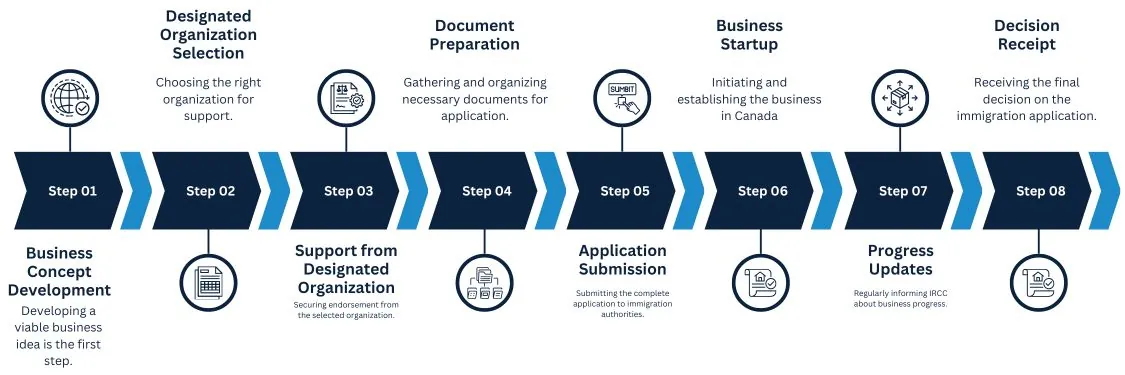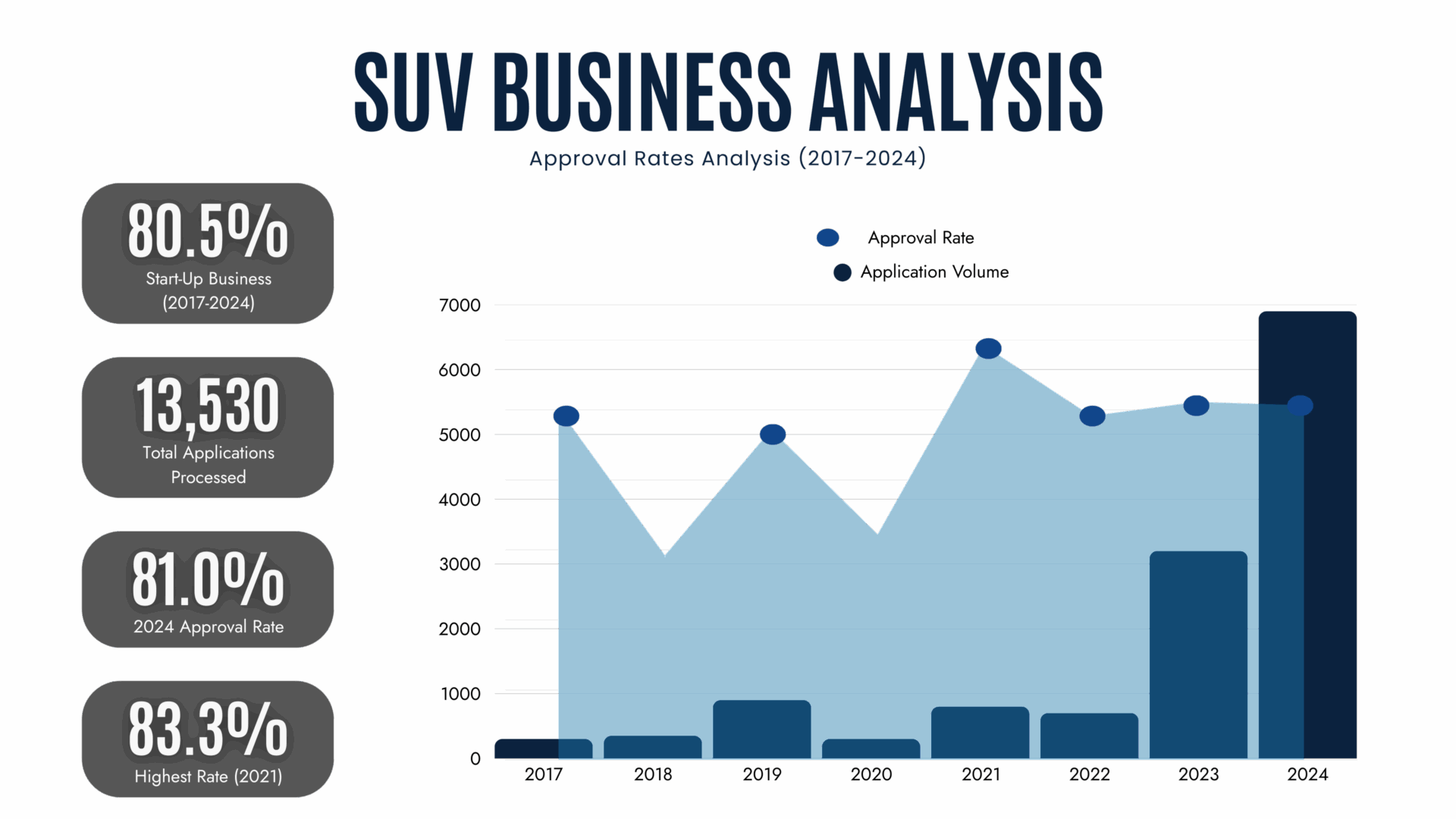Your definitive guide to launching your start-up in Canada in 2025 and beyond.





Your definitive guide to launching your start-up in Canada in 2025.
Foreign entrepreneurs can gain permanent residence in Canada by starting innovative businesses through Canada’s start-up visa. Immigration, Refugees and Citizenship Canada (IRCC) is responsible for processing applications and granting permanent residency through the program. The program is specifically designed for immigrant entrepreneurs seeking to establish innovative businesses in Canada. The program offers a pathway to permanent residency for immigrant entrepreneurs and their families to relocate to Canada, emphasizing the eligibility requirements, application process, and potential for securing permanent residence.

Immigration, Refugees and Citizenship Canada (IRCC), also known as Citizenship Canada, oversees the application process and grants permanent residency to successful applicants.
Under the Start-Up Visa program, Citizenship Canada IRCC is the authority responsible for evaluating and approving applications from immigrant entrepreneurs seeking to establish their businesses and gain permanent residency in Canada.
| Foreign Entrepreneurs |
|
|---|---|
| Eligibility Requirements |
|
| Investment Amount | Recommended: Access to minimum $100,000 CAD for startup investment. *Not mandatory by law, but often needed to secure a Letter of Support. |
| Processing Time |
|
| Key Risks |
|
| Benefits |
|
| Approval Rate | 86% approval rate (IRCC, February 2024). Higher success with strong designated organizations. |
To be eligible for the Canada Start-up Visa Program, applicants must:
Obtain a Letter of Support from a Designated Organization in Canada;
Incorporate and establish a business venture within Canada;
Individually hold a minimum of 10% voting rights in the company alongside a Designated Organization;
Collectively, the applicants and the Designated Organization must possess over 50% of voting rights;
Actively manage the business, with core operations in Canada during and after the application process;
Fulfill language proficiency at CLB 5 in English or French;
Have adequate settlement funds and operational capital, ideally over $200,000, in Canadian dollars. The required amount varies depending on the number of family members included in the application;
Present strong business plan and financials, as these are essential for approval.
Additional Resources to Read: Demystifying the Designated Organizations: How to Secure a Letter of Support from a Priority Organization for your Start-Up Visa Application
In addition to the Start-Up Visa program, there are various business immigration programs in Canada that international entrepreneurs can use to relocate to Canada. Specifically, you can explore the C11 Entrepreneur Work Permit, Intra-Company Transfer Program, Self-Employed Category, Provincial Nominee Programs, or Quebec Immigrant Investor Program.
Some of these programs focus on specific communities or sectors and require applicants to demonstrate that their business is eligible and has significant economic benefit to the region. See our table below to compare these programs and understand the pros and cons of some of the most popular business immigration programs.
| Criteria | Start-Up Visa | Provincial Nominee Programs | Temporary Work Permits to run a business in Canada (C11, ICT, C10) | Self-Employed Category (paused until January 2027) |
|---|---|---|---|---|
| Who can apply? | Business owners or professionals with experience or specialized knowledge | Individuals willing to start a business or invest in a particular province and obtain PR | Business owners, entrepreneurs, investors, professionals | Self-employed professionals in cultural or artistic fields, including athletics, with unique skills. |
| Type of Business | Innovative, scalable, business that can create jobs for Canadians, and compete globally. Must attract support or investment from Canadian designated organizations. | New or existing business that aligns with the target province's economic development and diversification priorities and contributes to the local economy. | Any business that will bring economic, social or cultural benefits to Canada (such as create jobs, stimulate economy or transfer knowledge or skills to Canadians) | Businesses that make a significant contribution to the cultural or athletic life of Canada. |
| Ownership Structure | Applicants must hold at least 10% of shares in the proposed business. Up to 5 applicants may apply | At least 33% of ownership, but may vary depending on province | Min. 51% of ownership is required | 100% ownership is common |
| Investment Amount | No min. investment is required, but recommended: $150,000–$200,000 | Vary by province, but starting investment amount is $100,000 (Alberta) | Business specific. Recommended: min. $200,000 | Business specific. Recommended: $100,000 |
| Language Skills | CLB 5 | Min. CLB 4 | Not required, but strongly recommended CLB 5 | Not required, but strongly recommended CLB 5 |
| Processing Time for Work Permit | Country specific, usually 2–6 months | Program specific, usually 4–6 months | Country specific, usually 2–6 months | Country specific, usually 2–6 months |
| Processing Time for Permanent Residence | Non-priority: 3+ years; Priority: no data available. | 2–3 years | N/A | Paused until January 2027. |
| Approval Rate | In 2024: 86% | No available data | Between 75%–88% | In 2024: 44% |

Concrete evidence like customer feedback or early sales significantly strengthens your application, and securing initial funding is critical for demonstrating the viability of your business concept.
Focus on businesses that solve genuine Canadian market problems or bring unique international expertise that can create a measurable economic impact.
Select and submit your proposal to at least 3 designated organizations for support, starting with the priority organizations first. You can apply to a business incubator, angel investor group, or venture capital fund, as these are the main types of designated organizations approved by IRCC for the Start-Up Visa program.
If your concept is at the ideation stage, focus on business incubators and consider a few angel investor groups, as venture capital funds rarely invest without proven revenue or paying customers.
Download curated directories of Designated Organizations prepared by the Sobirovs lawyers.
Present business concept to selected designated organizations through their formal pitch process, then undergo their comprehensive due diligence review.
This stage is time-intensive and can span 2-3 months per organization, as each has its own evaluation criteria and timeline before issuing a Letter of Support. Once a designated organization agrees to support your business, they will issue a commitment certificate to IRCC confirming their investment and support.
Be prepared for multiple rounds of presentations, financial reviews, and business plan refinements during this critical phase.
If you successfully secure a Letter of Support, congratulations! You can now begin the process of submitting your permanent residence application and all supporting documents to IRCC. Collect the required documents, such as:
Language test results
Proof of settlement funds
Work experience documentation
Other supporting materials
Submit your complete application online through IRCC’s permanent residence portal.
While your permanent residence application is processing, essential team members can apply for a 3-year open work permit to come to Canada and begin building the business.
This permit allows you to work on your start-up and pursue employment or other business opportunities.
Your family is eligible to join you in Canada.
You must demonstrate sufficient liquid funds to support yourself and your dependents while awaiting permanent residence approval. Obtaining a work permit is a step toward becoming a permanent resident and allows you and your family to settle in Canada while your application is processed.
While awaiting your permanent residence status, it is crucial to keep IRCC updated on your start-up’s progress, including demonstrating ongoing business establishment in Canada to maintain eligibility, as approval rates declined to 51% in early 2023 from a historical average of 75%.
IRCC officers routinely refuse SUV applications when applicants show minimal progress, present poor business models, or lack serious intent.
To mitigate these concerns, proactively provide business progress updates every 6 months, demonstrating your commitment to the venture and the quality of your business development.
If your application is successful, you will be granted PR status, marking a significant milestone on your entrepreneurial journey in Canada. Only Canadian citizens or permanent residents can be valid business partners in your start-up.
Should the decision be negative, you will be given reasons and, if applicable, instructions on how to address any deficiencies or appeal the decision.
Based on the latest IRCC internal data from December 2024, the Startup Visa program shows significant application volume with 18,780 applications currently in the system across all processing stages. With applications in inventory and annual admission targets of 5,000 set for each calendar year, there’s approximately 6 years’ worth of inventory at current processing capacity, explaining the extended processing times. Applicants are strongly advised to check the IRCC website for the most up-to-date information on processing times and application inventory.
Given the current inventory levels, applicants should plan for processing times at the upper end of estimates and consider the priority stream criteria to potentially reduce wait times. Immigration, Refugees and Citizenship Canada (also known as Refugees and Citizenship Canada) is responsible for managing the application backlog.
Standard Processing: as of July 2025: 50 months for regular stream applications, reflecting the substantial inventory backlog.
Priority Stream: Estimated 24+ months for applications meeting priority criteria (backed by $75,000+ Canadian capital or Canada’s Tech Network members), though official data not yet available. For information on Global Talent Stream work permit processing times, see this guide.
The Canada Startup Visa program demonstrates strong and improving approval rates, with a clear upward trajectory over the past three years. The program contributes to Canada’s economic growth by creating new jobs through innovative business ventures launched by immigrant entrepreneurs.
Total Applications Processed: 13,530
Total Approved: 10,890
Overall Approval Rate: 80.5%
Note: Approval rates are higher for genuine applicants whose proposed startup business demonstrates a significant economic benefit and potential for Canada.
| Year | Applications | Approved | Refused | Withdrawn | Approval Rate |
|---|---|---|---|---|---|
| 2017 | 290 | 230 | 55 | 5 | 79.3% |
| 2018 | 365 | 230 | 130 | 5 | 63.0% |
| 2019 | 800 | 620 | 155 | 25 | 77.5% |
| 2020 | 260 | 185 | 50 | - | 71.2% |
| 2021 | 720 | 600 | 70 | 50 | 83.3% |
| 2022 | 600 | 470 | 70 | 60 | 78.3% |
| 2023 | 3,850 | 3,145 | 440 | 270 | 81.7% |
| 2024 | 6,655 | 5,390 | 1,025 | 245 | 81.0% |

The improving trend suggests that both applicants and designated organizations have become more sophisticated in preparing applications that meet IRCC requirements.
With an 86% approval rate in 2024, applicants who successfully secure a Letter of Support from a designated organization and submit complete applications have strong prospects for permanent residence approval, making the program’s primary challenge obtaining initial support from designated organizations rather than the final IRCC decision.
The fees are approximate estimates based on market averages. Actual costs may vary depending on your business type and development stage.
Total Estimated Cost Range: $120,000 – $400,000+ depending on family size, business complexity, and designated organization chosen.
| Stage | Description | Cost (CAD) |
|---|---|---|
| Stage 1: Pre-Letter of Support | Business concept development, validation, pitch training, business plan refinement, designated organization selection and application assistance | $15,000 – $25,000 |
| Stage 2: Designated Organization Fees | Due diligence and support services (varies by organization and business strength) | $10,000 – $70,000 per founder |
| Stage 3: Immigration Application |
Legal Fees: $30,000–$50,000 per family. Government Fees: - Main Applicant: $2,385 - Spouse: $1,525 - Dependent Child: $260 each |
$30,000+ per family |
| Stage 4: Living Costs in Canada |
Minimum funds required (for 52 weeks): - 1 person: $29,380 - 2 people: $36,576 - 3 people: $44,966 - 4 people: $54,594 - 5 people: $61,920 - 6 people: $69,834 - 7 people: $77,750 |
$30,000 – $78,000 Varies by family size |
| Stage 5: Business Investment | Seed capital to cover operational costs of your start-up in Canada | Minimum $50,000 per founder or $200,000 per company |
Everyone Gets Rejected If One Essential Person Fails: If one “essential person” in your team gets refused, everyone else in your group application also gets refused. So, your immigration success depends on every key team member getting approved.
IRCC Thinks You’re Not Serious About Business: If immigration officers believe you’re only using the start-up as a way to get permanent residence and don’t genuinely want to build a business, they’ll refuse your application. You need to prove a real commitment to developing your company in Canada, not just securing immigration status.
Your Start-Up Will Probably Fail: Over 90% of start-ups fail, meaning you’ll likely lose all the money you invested in your business. Even if you get permanent residence, your business can still collapse, leaving you with major financial losses and no guarantee of success in Canada.
The Rules Can Change Anytime: The government frequently changes SUV program rules and has already reduced annual quotas significantly. New policy changes could affect your application even after you’ve submitted it, potentially making the process longer, harder, or completely different.
You Might Wait Years If You Choose the Wrong Organization: IRCC prioritizes applications from certain designated organizations and francophone applicants. If your designated organization isn’t on the priority list, you could wait much longer than the standard processing time to get your permanent residence approved. Long processing times can also affect your ability to travel back to your home country and maintain important connections with your family and community.
Business Flexibility: The SUV offers complete flexibility to run your business as you see fit, with no ties to specific locations or minimum presence requirements like most Provincial Nominee Programs.
PR Security Even with Business Failure: Even if your start-up fails, you’ll still receive permanent residence as long as you demonstrate genuine effort in trying to build your business.
Immediate Family Benefits: You and your family can relocate to Canada with 3-year open work permits, gaining access to healthcare, education, and other Canadian benefits while building your business.
Strong Success Rates: The program maintains higher approval rates compared to many other business immigration pathways, especially when working with experienced advisors and priority designated organizations.
North American Market Access: You’ll have the rewarding opportunity to grow your business in the North American market, giving you a real shot at scaling to a multi-million dollar company with access to one of the world’s largest economies.
Recently, a series of cases at the Federal Court level highlighted common issues that IRCC officers have been questioning in Start-Up Visa applications. These cases shed light on several key areas of concern for IRCC, such as:
Applicant’s direct experience
Substantive proof of the business’s past and projected performance
Essential operations that are to be based in Canada
Applicant’s engagement with the Designated Organization during the application’s waiting period,
Overall viability of the business, including its growth orientation and the size of the target market.
“These cases suggest a more rigorous examination of the authenticity and intent of SUV applicants’ business activities in Canada. Therefore, it’s essential to demonstrate intent that aligns with the program’s objectives—to establish and grow an innovative business in Canada and to relocate permanently to oversee its development rather than using the program solely as a means for immigration.” Feruza Djamalova, Senior Business Immigration Lawyer
Test Your Business Concept: Test your business concept with real customers and gather concrete evidence of market demand before approaching designated organizations – pilot sales, user feedback, or partnership letters significantly strengthen your application.
Keep Good Records: Document all business development activities, market research, customer interactions, and validation efforts from day one to demonstrate genuine entrepreneurial commitment.
Build a Strong, Qualified Team: Assemble team members with relevant experience and qualifications for your venture, ensuring each person brings valuable expertise to the business.
Verify Team Admissibility: Ensure that each essential team member is admissible to Canada with no criminal record or serious medical issues, since one rejection can sink the entire group application.
Apply to Multiple Organizations: Submit to several designated organizations simultaneously to increase your chances of securing support and compare different partnership opportunities.
Prepare for Due Diligence: Expect thorough evaluation processes lasting 2-3 months per organization – have your financials, business model, team credentials, and market analysis professionally prepared.
Maintain Regular Team Communication: Keep consistent communication with your designated organization and team members throughout the processing period to demonstrate ongoing commitment.
Document Everything: Maintain detailed records of all business activities, progress milestones, and development efforts to support regular IRCC updates every 6 months.
Be Committed to Your Start-Up: Show genuine dedication to building your business in Canada and embrace the local entrepreneurial ecosystem through networking and community involvement.
If your application fails for any reason, you may request a substituted evaluation based on your likelihood of economic establishment in Canada. IRCC can still approve your application if you prove you’re capable of generating income in Canada independent of your start-up through factors like educational credentials, in-demand skills, work experience, and available funds.
It’s important to build a strong professional portfolio in Canada and demonstrate your ability to establish yourself economically, regardless of the start-up program outcome – this serves as both a safety net and strengthens your overall application.
Below, you will find answers to the most frequently asked questions that are based on market research and our experience with Start-Up visas:
On This Page
Your AI Immigration Assistant
👋 I'm here to help you explore Canadian business immigration options — specifically for investors, entrepreneurs, and business owners.
How it works: We'll chat for up to 60 minutes. I'll ask a few questions, suggest immigration pathways, and answer yours. I’ll notify you when 15 minutes remain.
📌 What I Can (and Can't) Do:
